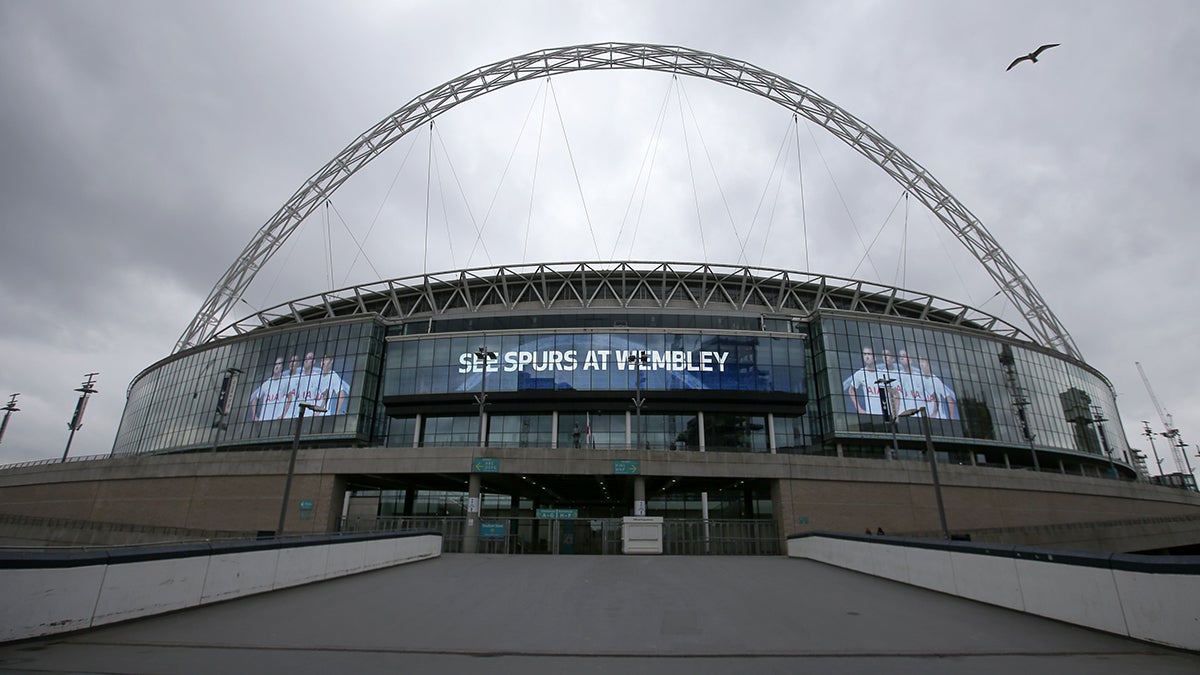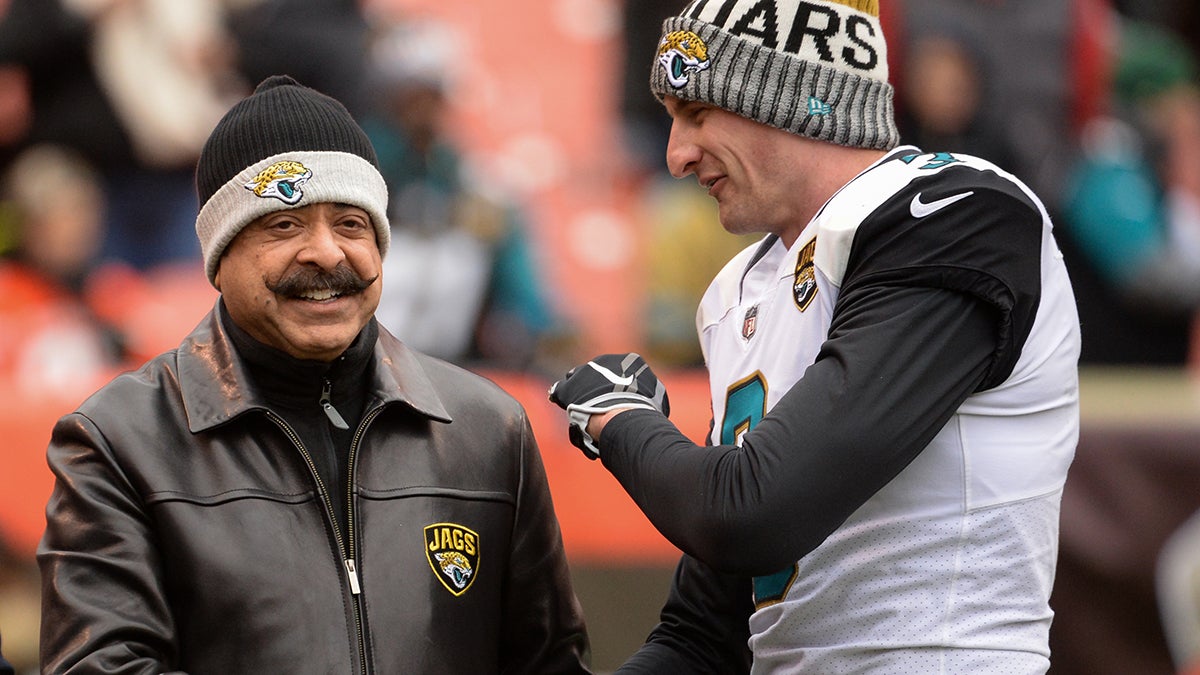Opinion: Proposed Wembley sale latest move in globalization of Premier League

The news that Shahid Khan, the Pakistani-born car parts magnate and Jacksonville Jaguars owner, is in talks to buy London’s iconic Wembley Stadium for close to $1 billion, was greeted by many English football fans not with outrage, but with a wistful resignation, and a raised this-is-what-it-has-come-to eyebrow.

Not long ago, such news would have been met with universal, stunned outrage, and a ferocious backlash. But the English have become accustomed to the foreign takeover of their game – addicted to it, even, when you consider the ensuing benefits in terms of the quality of play, as so many of the world’s best come to play in the Premier League.
Still, the news of Wembley felt momentous. This really is what it has come to – the national sport’s cathedral possibly being handed over to an NFL owner eager to relocate a team that plays a different type of football across the Atlantic (with proper assurances that when convenient, the English national team can also continue to rent it out for their type of football).
There is no equivalent to Wembley in all of American sports. Imagine if we’d invented the world’s most popular sport, and our national all-star team in that sport played other nations at one massive stadium in the capital dedicated almost exclusively to such international competition, as well as domestic cup finals presided over by the royal family. And imagine if in that stadium we had consecrated our one and only world championship, in 1966. That would be our Wembley.
The hallowed legend, truth be told, had already been a bit hollow in recent years. The modern Wembley bears little resemblance to the original after an extensive rebuild. The stadium’s exclusivity and purity of national purpose had already been eroded over time by visiting NFL matches, concerts, and more recently, the temporary residence of one of the Premier League clubs, Tottenham, while it rebuilt its own stadium across London.
But the main reason fans aren’t more aghast is because the sale of Wembley (by its current owner, the Football Association) would only be the latest marker in the globalization of the English game, and only the latest piece of evidence to suggest that there isn’t enough money in England to finance English football, not at its current level of ambition. And so, much like many impoverished members of the old nobility were forced to sell off their grand estates in the last century, many of England’s leading tycoons have been forced more recently to sell off their Premier League clubs to deeper-pocketed foreign owners.

This season, 13 of 20 Premier League teams are foreign-owned. The roster of those who’ve bought into this most global of sporting leagues includes wealthy investors from the United States, China, Russia, Thailand, the United Arab Emirates, Iran and Italy.
English fans often lump foreign owners together — overseas billionaires rushing in to buy prized assets to show off, another indulgence to go along with the yacht, prime London real estate and art collection. But it’s increasingly apparent that the American Premier League owners – in charge at Manchester United, Liverpool, Arsenal, Crystal Palace and Swansea – are a breed apart.
For the non-American owners, the acquisition of an English football club is a status-conferring reward for a fortune made in another industry, possibly even the fulfillment of an impassioned fan’s dream. In some cases, owning the club is akin to a hobby, albeit the hobby of sophisticated investors eager to see their assets appreciate. Russian oil baron Roman Abramovich, who made his fortune in the post-Soviet privatization frenzy, has described his purchase of Chelsea as an impulse buy after attending a big match and being moved by the electric atmosphere in the stands.
But in the case of American owners, the business of sport is already their business. Every current American Premier League owner also owns an interest in a U.S. sports team, including the L.A. Rams, Boston Red Sox, Tampa Bay Buccaneers, Philadelphia 76ers, Memphis Grizzlies and DC United.
Motivations vary, of course, but one reason all these owners are investing in the Premier League is the realization that it offers a global reach their domestic sports franchises back in the U.S. don’t. If you’re in the business of sport, and you want to take all the expertise you’ve acquired managing and commercializing an MLB or an NFL franchise and expand your market overseas, you’re better off buying into the world’s sport and applying your business savvy to it than you would be trying to get people elsewhere in the world to play a new game.
In addition, these American sports entrepreneurs are further encouraged to buy into English football by their sense that the game has an astonishing global following despite, and not thanks to, the sophistication of the sport’s marketing. American executives recruited from U.S. sports leagues to work at Premier League clubs (including some not owned by Americans) often find tradition-bound English football to be behind the curve in monetizing teams’ brands, and in enhancing fans’ gameday experience. They see a massive opportunity.
All this leaves English fans feeling conflicted about American owners. Unlike what might be said of Russian or Asian owners, fans suspect American owners of the heresy of caring more about another sport. It’s bewildering to fans of a Liverpool or a Manchester United to think that their owners might care more about the Red Sox and the Buccaneers; more about another sport altogether. On the other hand, the sports and marketing savvy of the American owners can also be reassuring; presumably they know what they’re doing, and they might be building a more viable project than a mere billionaire’s whim.
In the end, it’s all about winning. There are both successful and unsuccessful foreign owners, as there are domestic ones, and there’s little resentment or commentary of an owner’s provenance when things go well. With Liverpool in the European Champions League final this year, fans would probably still hail owner John Henry if he showed up to the match wearing a Red Sox jersey.
Back at Wembley, it will be interesting to see what becomes of Khan’s bid, and of his desire to bring his Jaguars to London. Khan is also the owner of a major London club, Fulham, currently playing one league below the Premier, but with a strong chance of moving up next season.
He is a man betting on both flavors of football simultaneously, eager to plant his flag on the NFL’s rare foreign beachhead of London, while investing in the English game as well. He is a true import-export sports merchant, playing the ultimate game of sports globalization.
Andres Martinez is a professor of practice in the Walter Cronkite School of Journalism and Mass Communication.
Related Articles
Wembley: Shahid Khan wants to host World Cup and Super Bowl at stadium
Don't count on a boycott to interrupt Russia World Cup
Fielding diverse lineups, ownership pays off in Premier League, Major League Baseball
England’s Premier League is globalized, but even Brexit-rattled Britain cheers. For now
New stadiums more than a place to watch a game

